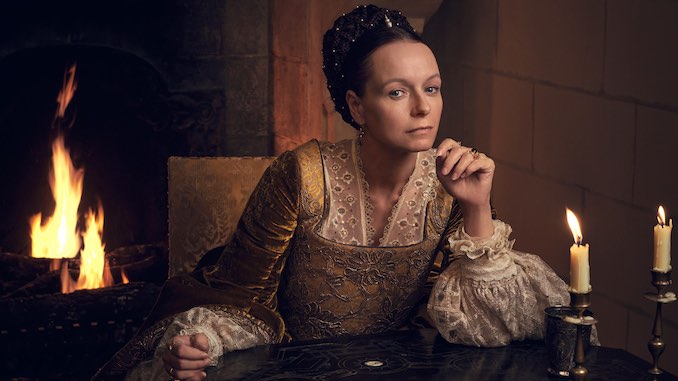Samantha Morton on Alpha, Harlots, and What Makes The Serpent Queen a Different Kind of Costume Drama
Photo Courtesy of Starz
In Starz’s The Serpent Queen, Samantha Morton stars as Catherine de Medici, the queen of France from 1547 to 1559. The eight-episode series is based on Leoni Frieda’s book of the same name, which explored Medici’s alleged extreme interests in astrology and psychic powers.
For Morton, it’s not her first time at the period-piece rodeo. She made her debut on British channel ITV’s version of Emma in 1996, quickly followed by the network’s Jane Eyre in 1997. The two-time Oscar, Emmy, and British Academy Award-nominated actor more recently starred in Harlots and as the bat-shit, wicked Alpha on The Walking Dead (Note: Morton is currently reprising that role in flashbacks on Tales of the Walking Dead).
So for a few moments during a press junket for her latest series, we chatted about The Serpent Queen (and, although it’s early days, Morton hinted at the possibility of a second season), Walking Dead and Tales of the Walking Dead, plus the late, great Harlots.
![]()
Paste: Catherine de Medici was a Queen of France with a lot of myths and legends attached to her. Knowing this, what was your approach to making her relatable and more human?
Samantha Morton: I think that ultimately, any character I play I try to inherit them in their skin and in their bones, their breath, their… just be them, and without being too analytical about it; I try to not psychoanalyze my characters.
I just try to feel them and see them, and then I hope when I am there in the moment—after lengthy discussions with Justin [Haythe], who is the writer/showrunner/director who did the first episode with me and Erwin [Stoff], who is the executive producer—but we had enough understanding of my interpretation and I think after that, a lot of the myths around her is down to the writing. That’s Justin humanizing her, and ultimately this is a story about survival and love and a young girl under the most abstract circumstances of fate finding herself at this court and then being the cleverest person in the room and watching all these idiots run the show and going, “I can do this a lot better and also, I was meant for this. I got this.” Znd also, to protect France.
These were really high stakes, and she had to make sure she was really, really playing the game better than anybody else, like a really hard game of chess.
Paste: There are so many dark comedic moments and some of the dialogue is contemporary. It’s like the writers are playing with words where, right in the middle of something very serious, there’s this 21st-century dialog. What are your thoughts about that?
Morton: I like that. I like that because so often with storytelling—certainly when someone is in a corset or a wig and it’s all period—it’s all so fake, so false. It seems so distant from reality but it is just entertainment, and for me, I like to feel connected, that they are taking me on this journey and I think the fact that this is based on a true story, we have the responsibility to tell make sure that we are contemporizing it to a language of today. Otherwise, what’s the point? We’d be doing Shakespeare and that’s not what this is.
Paste: Liv Hill plays the younger Catherine, how did you two work together to mold your characterizations of Catherine from younger to older so the two would sync?
-

-

-

-

-

-

-

-

-

-

-

-

-

-

-

-

-

-

-

-

-

-

-

-

-

-

-

-

-

-

-

-

-

-

-

-

-

-

-

-








































